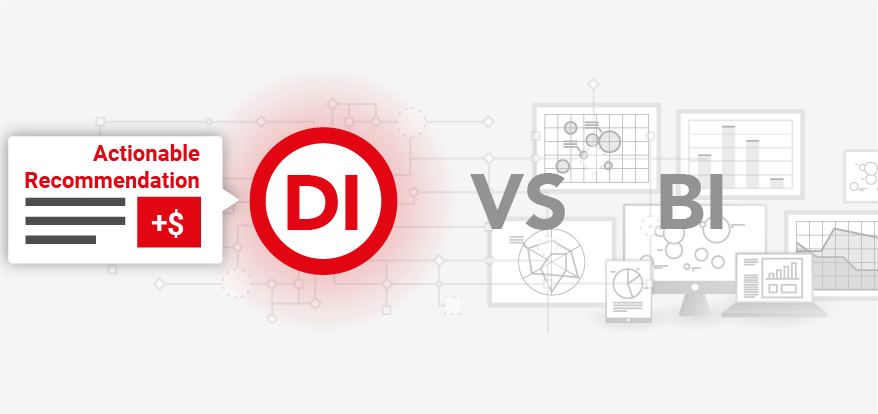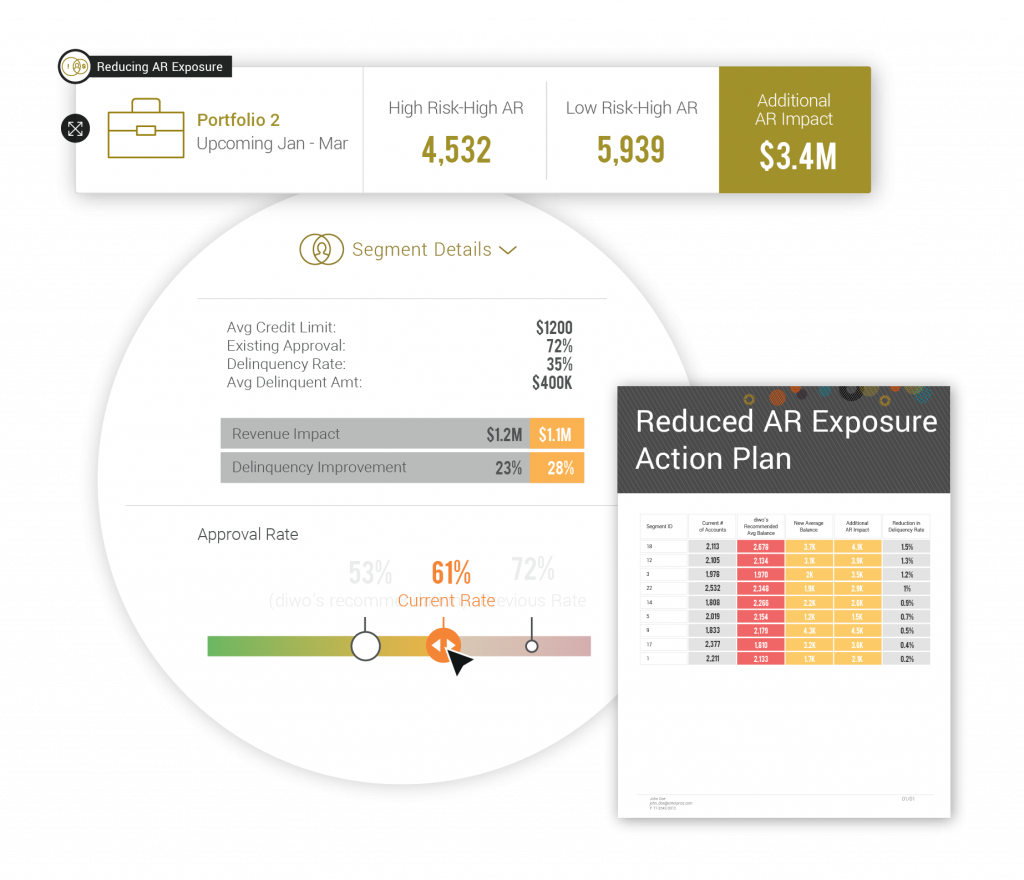
Decision Intelligence (DI) vs Business Intelligence (BI)
What is the difference between Decision Intelligence (DI) and Business Intelligence (BI)?
Across every industry, companies are generating and storing data at an exponential rate. In recent years it has become easier to collect, process and analyze data thanks to technologies such as the cloud, AI, machine learning and automation. Despite the tsunami of insights being produced, effectively turning insights into action remains elusive to many businesses. Dashboards have failed to deliver on the promise of providing timely insights in a way that makes it easy for users to understand, quantify and act upon them. This is where decision intelligence (DI) can help. DI accelerates the path from data to decisions by quickly identifying what is happening in your business, uncovering why metrics are changing and surfacing AI-powered recommendations to improve business outcomes. Both DI and BI have a goal of supporting a user to gain insight from their business data to support effective decision-making. It can be argued that DI delivers a faster, more reliable time-to-decision based on its use of AI, machine learning, contextual intelligence, process automation and UX innovation.
The growing volume and variety of data and the soaring speed of business means it is challenging for companies to ensure that the right data is presented to the right people at the right time – i.e. contextually. In today’s environment, traditional BI platforms and self-serve BI are becoming irrelevant for many day-to-day decisions because it simply takes too long to get insights and then there is the “decision gap” between having insight and making a decision. While companies around the world overwhelmingly recognize that data-driven decision-making outperforms intuition, most are still not realizing the full value of their data with traditional BI tools.
For years, the key output of almost every data analytics initiative has been to deliver dashboards to business users and decision-makers along with visualizations that help the data tell a story regarding the question at hand. Although they convey snapshots of important measures, insights from BI dashboards are not contextualized, easily consumable or actionable by the majority of business users. Additionally, BI dashboards can’t support decision-makers in the business moment when they need to take action. It takes a trained data analyst three to five days to produce a dashboard. On average, as many as 8-12 different dashboards are reviewed before making an effective decision. Not only is this process complex, time-consuming and prone to error and bias, it also causes cognitive overload from requiring a user to interpret multiple sources of the truth. At scale, BI is driving tens of thousands of hours of inefficiency. There is a cost to legacy BI that goes way beyond the poor productivity and wasted hours. The real cost is in not being a data-driven business or creating a competitive advantage from all your data.
Understanding the reasons why performance changes and how to respond appropriately no longer takes hours of data analysis or requires complex coding. In contrast to the typical BI process, decision intelligence powered by AI enables a much more streamlined process to accelerate decision-making with actionable recommendations that empower users to dynamically respond to their business environment. The adoption of decision intelligence will reduce BI bottlenecks and decision latency and empower people across the business to respond to changes in the business quickly and consistently. Let’s look at the key differences between BI and DI.
Business intelligence (BI) applications were architected 20+ years ago. They are built around older data structures, work with aggregated subsets instead of all data, don’t support support machine learning and require significant input from specialists and data teams to optimize them and deliver the insight they promise. Business intelligence tools were designed to present historical data and convert them into insights about the business – delivered in a report or dashboard that can take days-weeks to complete. Dashboards deliver static insight and lack context around why the data changed. Without context a business user can only see that an event occurred – not why it occurred – this is particularly problematic since the whole point of BI platforms is to reduce the scope for human error in the decision-making process.
Decision intelligence (DI) handles the complexities and volume of today’s data. It utilizes a modern data architecture to take all of a company’s data into account, particularly predictive information and business context. Decision intelligence leverages technologies such as machine learning as well as decision workflows to analyze and break down the complex factors and relationships impacting KPIs. This approach provides deep insights and dynamic recommendations taking every piece of available information into account – not the case with BI today. AI-powered insights and recommendations are the shortest path between questions, answers, action and immediate business impact. DI applies machine learning algorithms, contextual intelligence along with AI-driven automation to close the “decision gap” by delivering timely, relevant recommendations that understand business context and decision intent to accelerate decision-making.
Decision intelligence is designed to augment human decision-making. It sets a new standard for effective decision-making by automatically answering the “why did performance change” and “how to improve performance” questions surrounding a given business metric. The “how to improve performance” is key information for all decision-makers and traditional dashboards are not designed to tell business users why things change or determine next-best action. This level of analysis requires much more intelligence than the typical static information found in dashboards.
With data-driven insights at the core of driving new business opportunity, increasing operational efficiency and strengthening customer relationships, organizations that have historically relied on dashboards and manual data analysis are shifting to decision intelligence to enable their business and analytics teams to make better decisions, faster and more consistently. Eventually, DI will become a widespread strategic tool that organizations will rely on to effortlessly decide on the best possible business outcomes. DI will rapidly accelerate the journey towards these outcomes, enabling faster decision-making while eliminating the common errors associated with BI, such as multiple versions of the truth, decision latency and human biases. Gartner predicts that by 2023, a third (33 percent) of large organizations will have analysts practicing decision intelligence, including decision modeling.
With Diwo’s DI platform, any decision-maker in your organization can access recommendations that support day-to-day decisions, while understanding the trade-offs, consequences and business constraints – without having to toggle across myriad dashboards or reports. Another differentiator for Diwo is the user experience that it supports, which is natural language based. The output of Diwo’s DI platform is also markedly different.

“The DI platform’s job is to surface as much insight and recommendations as it can and let the human being take that information, validate it and figure out what to do next.”
Instead of giving the user myriad dashboards and letting them “find the answer”, Diwo delivers the insights and recommendations that business users need to make effective decisions. Insights and recommendations are simple, easy to understand and not subject to interpretation.Through the convergence of AI, machine learning, contextual intelligence and automation not as separate tools, but in a unified application, companies can make actionable insights and recommendations from complex data readily accessible to business users.
For a deeper dive into how Diwo’s Decision Intelligence platform compares to BI, visit diwo.ai/decision-intelligence-resources/comparing-diwo-to-bi/